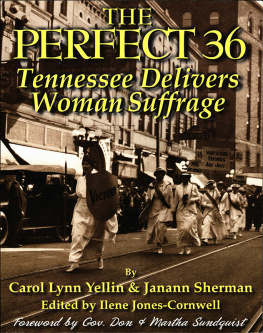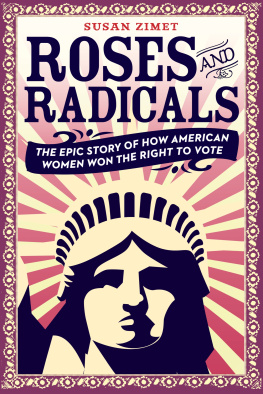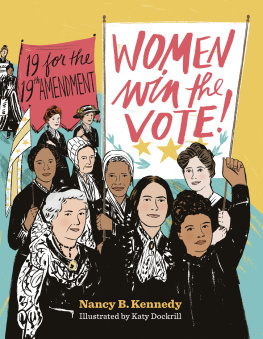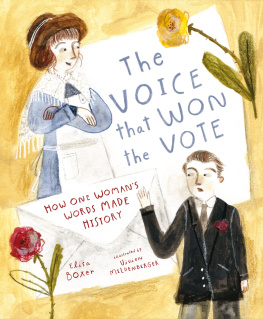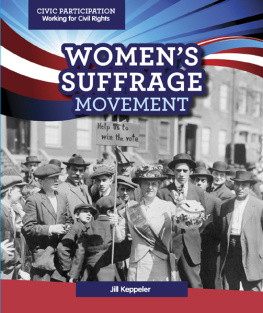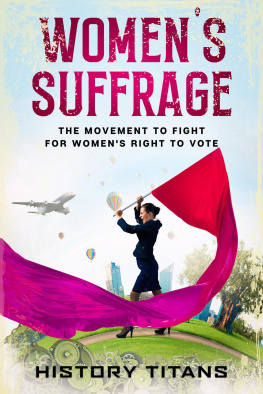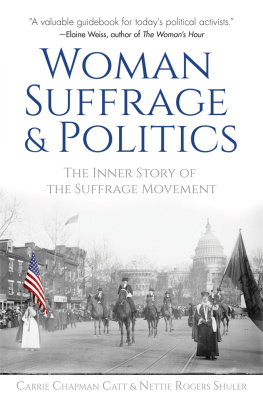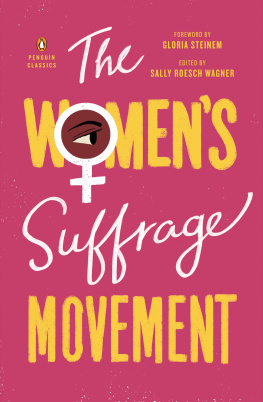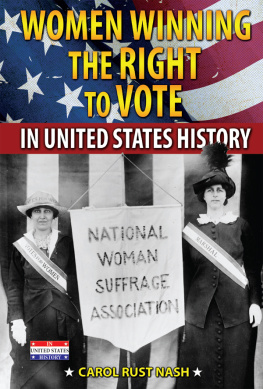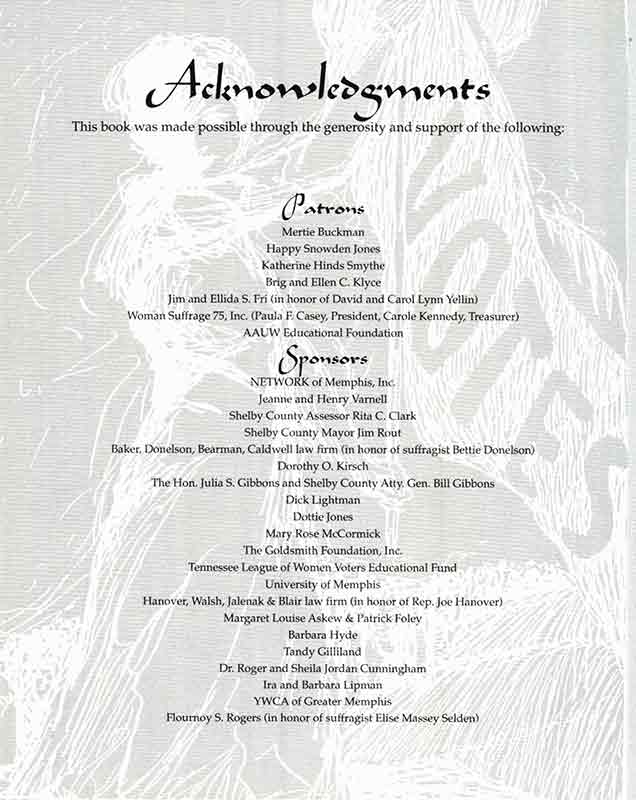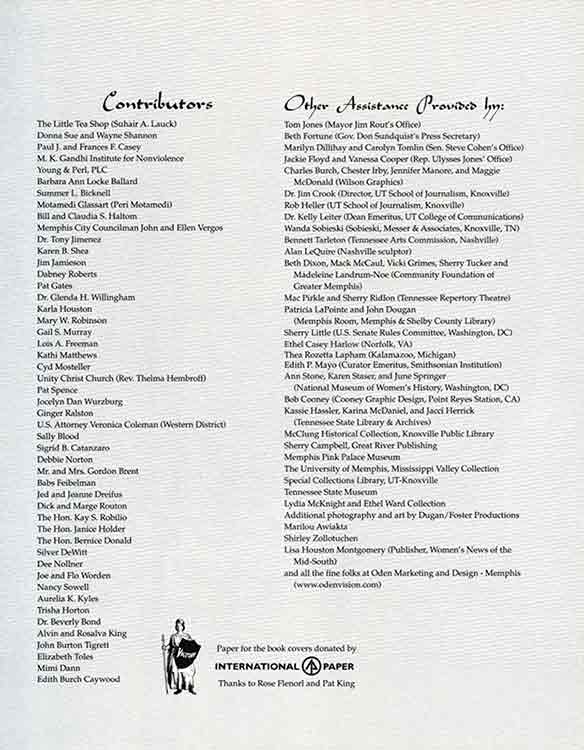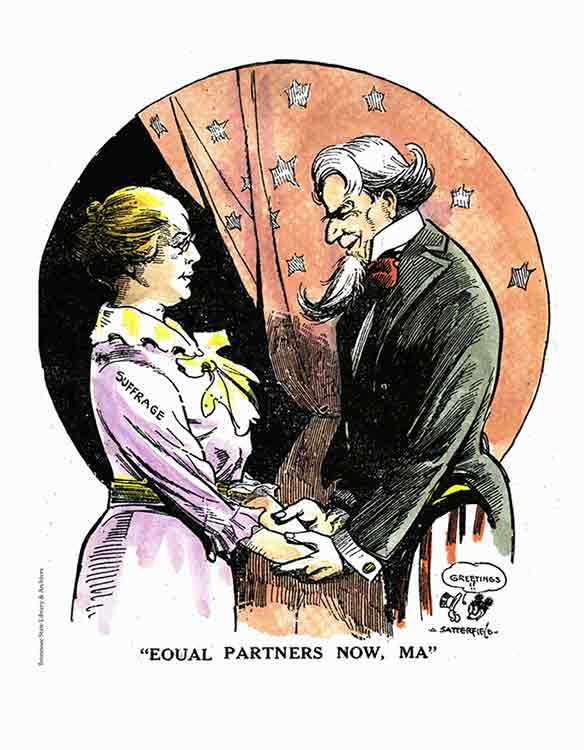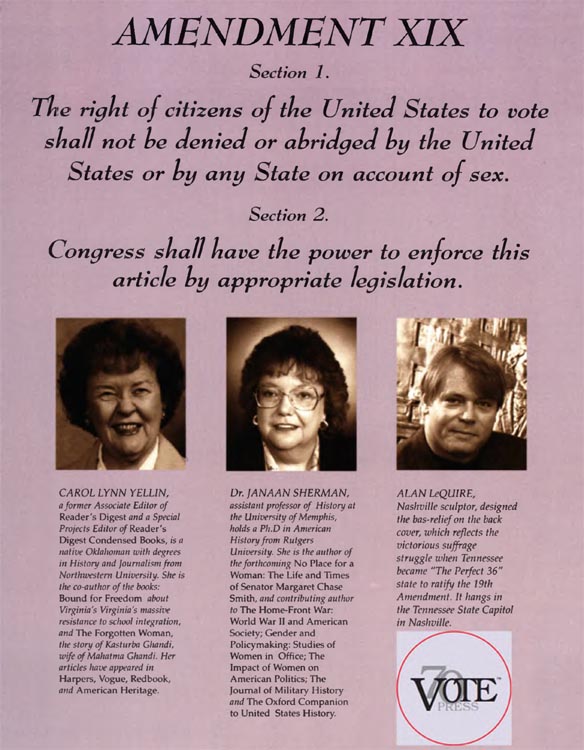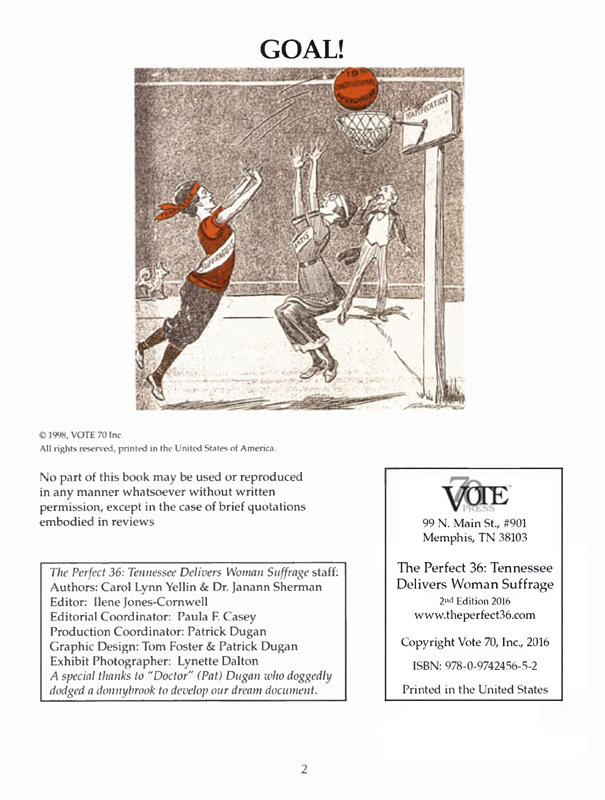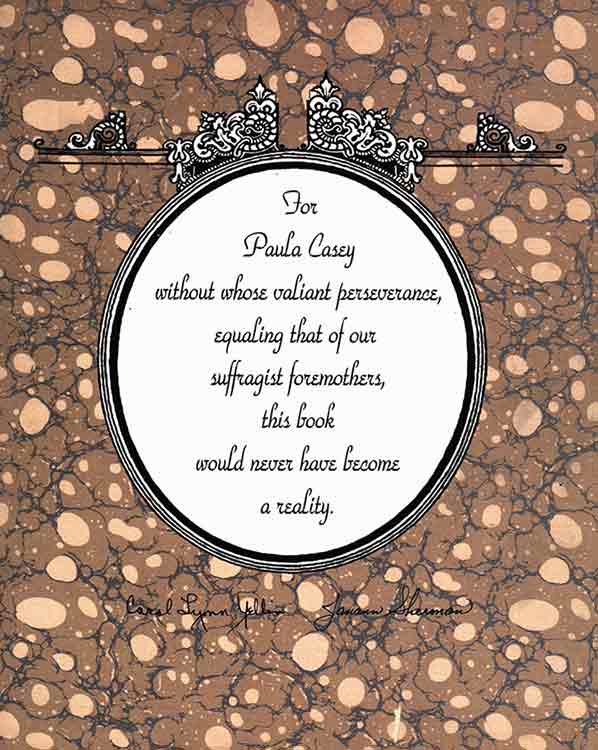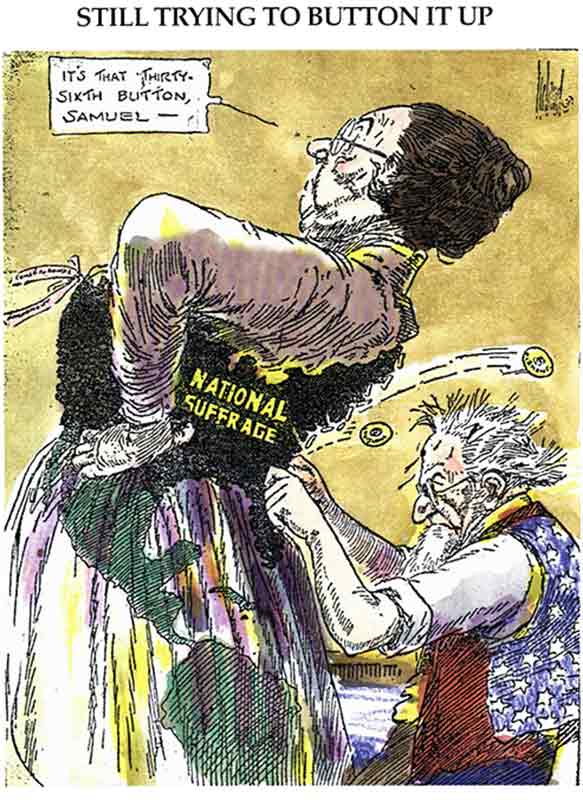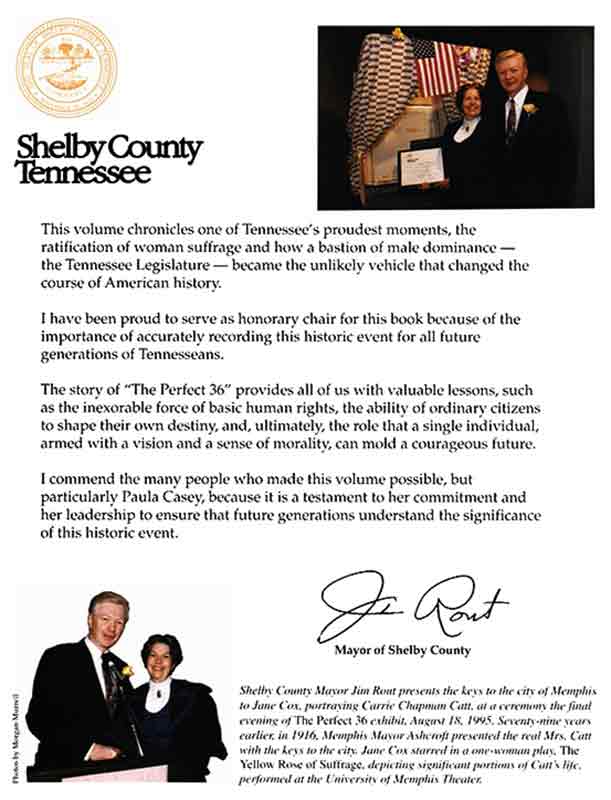FOREWORDS
When the 75th anniversary of woman suffrage was celebrated across the nation in 1995, we were fortunate in Tennessee to have several individuals who made our celebration as The Perfect 36 particularly meaningful.
First, we had premiere woman suffrage historian, Carol Lynn Yellin of Memphis, who wrote the definitive article Countdown in Tennessee that appeared in American Heritage in December, 1978. No one else in Tennessee had her knowledge and research on this important subject.
Then, we were fortunate to have Dr. Janann Sherman, historian and biographer of the late Senator Margaret Chase Smith, who joined the faculty at the University of Memphis in 1994. Dr. Sherman agreed to undertake another massive project mounting an exhibit at the universitys Art Gallery unlike any that had ever been done before. For the first time, original artifacts, papers, photographs and memorabilia about the struggle for woman suffrage were gathered under one roof.
This outstanding exhibit, which traveled across the state, featured materials that had never been seen before by the general public. Photographs of that exhibit are seen throughout this book, and they help tell the story of how American women won the right to vote after a 72-year struggle.
This celebration of Tennessees pivotal role in the passage of the 19th Amendment coincided with another important celebration Tennessees Bicentennial. It has been our great privilege to be in the Executive Residence as these celebrations unfolded throughout 1995 and 1996. We have learned so much about what Tennessee has contributed to our great nation. It has also reminded us of how our democracy works and the role that all citizens can play.
The struggle for American women to win the vote is one of the greatest in our nations history. They achieved their goal against enormous odds. Generations of women and the men who supported them are recounted in this magnificent story. It is a story of dedication, courage, persistence, patriotism, bipartisanship and undaunting faith.
We are proud of the Tennessee General Assembly in 1920 both Republicans and Democrats who worked together to secure our states place in this great history. It was Harry Burn, a Republican and the youngest member of the Legislature, who cast the deciding vote. Susan B. Anthony, the great suffrage leader, was a Republican as was suffragist Alice Paul, whose grandfather founded the Republican Party in New Jersey.
It was Governor Al Roberts, a Democrat, who called the Legislature into special session to vote on the 19th Amendment. We are proud of the members of the Shelby County legislative delegation who led the way, and especially Representative Joe Hanover of Memphis, the second-youngest member who kept the pro-suffrage forces together as floor leader. A Polish immigrant, he believed so strongly that everyone should have the right to vote in a democracy that he ran for the General Assembly just to cast his vote for the 19th Amendment.
That it happened in Tennessee when no other state was close is a source of immense pride. We hope that, after reading this inspiring story of the difficult struggle the suffragists endured, you will cherish your right to vote.

Don Sundquist
Governor of Tennessee |  | 
Martha Sundquist
First Lady of Tennessee |
It has been my pleasure to help preserve the story about this important event in Tennessees history. As a state senator, I am proud that the state Senate voted overwhelmingly in favor of the 19th Amendment in 1920. The ratification of the 19th Amendment on August 18, 1920, with the House following the Senate in concurrence, was Tennessees greatest gift to this country.
I was proud to be the sponsor of the legislation, with my House colleague, Rep. Brenda Turner (D-Chattanooga), creating the suffrage sculpture which was placed in the State Capitol in 1998. No monument to the suffragists of Tennessee or to this momentous occasion when 27 million American women became enfranchised has existed in our Capitol. We have rectified this lack of awareness with the publication of this book and the sculpture.
Future generations will be able to read about this 72-year struggle which is among the most compelling in American history. They can tour the State Capitol in Nashville and see the powerful bas-relief created by sculptor Alan LeQuire commemorating the suffragists victory.
All Americans can take great pride that generations of suffragists achieved their goal of obtaining equal suffrage through dedication and nonviolence. They proved democracy and our U.S. Constitution work. It is a story well worth preserving.

State Senator (D-Memphis) |
It Happened
in Nashville...
...in August, 1920, when Tennessees all-male, all-white, mostly good-ol-boy legislature met for three weeks in special session to defend, denounce, cuss, discuss, and finally to ratify with a majority of but a single vote the so-called Susan B. Anthony Amendment.
This action, in effect, marked the moment of enfranchisement for one-half the adult population of the United States, because Tennessee (which was immediately proclaimed The Perfect 36 by commentators and cartoonists of the day) thereby became the pivotal 36th state needed to complete ratification by three-quarters of the then 48 states.
It also marked the climax of 72 years of ceaseless campaigning by four generations of American women activists. Seasoned veterans of the suffragist struggle said this last battle Armageddon in Nashville was the toughest ever. Such it may well have been, since among the things the suffragists and their supporters had to contend with en route to victory were threats, bribes, lawsuits, cajolery, dirty tricks, injunctions, tapped telephones, rumors of kidnappings and double-crossings, fugitive quorums and other parliamentary shenanigans, not to mention overwrought propaganda leaflets distributed by flag-waving, rose-bedecked, anti-suffrage Southern ladies, and free-flowing, Tennessee-brewed Jack Daniels whiskey dispensed 24 hours a day from the liquor lobbys Hospitality Suite on the eighth floor of Nashvilles Hermitage Hotel. Yet, with all of that, the decisive drama that unfolded during those hectic days in Tennessee that summer must be counted as one of democracys finer triumphs. Which is, as a matter of fact, pretty much the way the suffragists themselves saw it.

